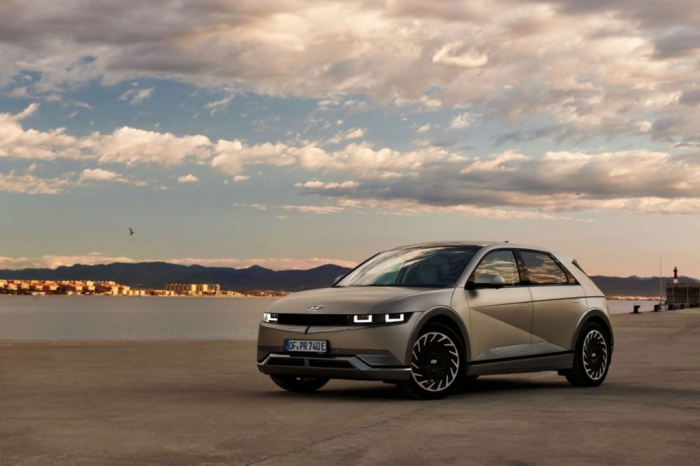Electric vehicles
Hyundai, BAIC Motor to inject $942 mn in China JV for EVs
Beijing Hyundai considers production and sales of EVs based on E-GMP in China with a plan to develop models only for the mainland
By Mar 20, 2022 (Gmt+09:00)
2
Min read
Most Read
LG Chem to sell water filter business to Glenwood PE for $692 million


KT&G eyes overseas M&A after rejecting activist fund's offer


Kyobo Life poised to buy Japan’s SBI Group-owned savings bank


StockX in merger talks with Naver’s online reseller Kream


Meritz backs half of ex-manager’s $210 mn hedge fund



Hyundai Motor Co., South Korea’s top automaker, is set to invest more in China to revive its business on the mainland through quality electric vehicles.
Hyundai and China’s BAIC Motor Corp. have decided to increase the capital of Beijing Hyundai by $942 million mostly for the EV business with each shouldering half of the investment in the 50-50 joint venture. Both companies are scheduled to inject half by June and the rest by December.
“The main purpose of the transaction is to strengthen the capital stability of Beijing Hyundai and to effectively respond to the need for further investment in the face of the electrification of China's automotive industry,” BAIC said in a filing to Hong Kong Exchanges and Clearing Ltd (HKEX) on Friday.
China is the world’s largest EV market with fast growth as customers bought more than half of new EVs produced around the world. Last year, the country’s EV sales jumped 169.1% to 3 million in 2021. The eco-friendly vehicles accounted for 15% of total passenger car sales last year.
HYUNDAI’S WEAKNESS IN CHINA
Hyundai has been sluggish in the country’s EV market selling fewer than 5,000 units last year, far behind not only the global leader Tesla Inc. but also Chinese makers such as BYD Co. and Nio Inc.
The South Korean carmaker had been shunned by customers since it sold electrified versions of existing internal combustion engine cars, not models based on dedicated platforms.
Beijing Hyundai is considering production and sales of EVs based on its proprietary Electric-Global Modular Platform (E-GMP) in China with a plan to develop models only for the mainland. The capital increase is expected to support the plan, industry sources said.
MOST IMPORTANT TASK
A revival in China, the world’s largest automobile market, is one of the most important tasks for Hyundai. The automaker has been sluggish since 2017. Its sales shrank to 360,565 units in China last year, less than a third of 1.1 million units in 2016.
Chinese customers avoided Hyundai amid a diplomatic row between Beijing and Seoul over South Korea’s deployment of the US anti-missile defense system THAAD. Hyundai also focused on sedans, while customers in the country preferred sport utility vehicles (SUVs).
Some industry sources said Hyundai’s strategy of price cuts in the early and mid-2010s to boost sales contributed to its sluggishness. The policy caused customers to regard Hyundai as a competitor of local brands, not an imported car maker with reasonable prices, they added.
Hyundai is now focusing on the establishment of a luxury brand image in China, rather than increasing sales. It plans to launch models that are popular in developed markets such as the US and Europe rather than low-cost cars, while bringing its premium brand Genesis into the market.
Write to Byung-Uk Do at dodo@hankyung.com
Jongwoo Cheon edited this article.
More to Read
-
 AutomobilesHyundai Motor raises N.America workforce, cuts China staff
AutomobilesHyundai Motor raises N.America workforce, cuts China staffJul 07, 2022 (Gmt+09:00)
1 Min read -
 Electric vehiclesKia Sportage speeds up Hyundai’s eco-friendly push
Electric vehiclesKia Sportage speeds up Hyundai’s eco-friendly pushJun 19, 2022 (Gmt+09:00)
2 Min read -
 Electric vehiclesHyundai, Kia speed up expansion in European EV market
Electric vehiclesHyundai, Kia speed up expansion in European EV marketMay 30, 2022 (Gmt+09:00)
2 Min read -
 Electric vehiclesChina rules EV market with fleet sales; Hyundai targets retail
Electric vehiclesChina rules EV market with fleet sales; Hyundai targets retailMar 15, 2022 (Gmt+09:00)
2 Min read -
 Electric vehiclesHyundai accelerates electrification strategy, targets 7% of EV market
Electric vehiclesHyundai accelerates electrification strategy, targets 7% of EV marketMar 02, 2022 (Gmt+09:00)
4 Min read
Comment 0
LOG IN


